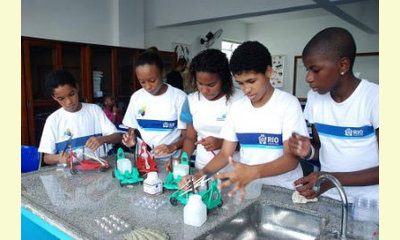|
|
These Four Cities Are Making Youth Empowerment a Priority
un article par Josephine d'Allant, Managing Editor, URB.im
A pressing question for many cities is how to create the right educational, social, and economic opportunities for young people so that they gain the tools to build strong foundations for adulthood. The following examples from Jakarta, Lagos, Rio de Janeiro, and Bangalore demonstrate how a caring mentor, a specialized school, or a skills training program can empower youth to transform their lives. Read on to find out more and then visit URB.im to share your thoughts.

Photo credit: Secretaria Municipal de Educação de Rio de Janeiro,
click on photo to enlarge
In Jakarta, the street child phenomenon is a real epidemic. In response, the government has created the Child Social Welfare Program, which works in collaboration with community-based organizations to provide street children with shelter and various life skills that enable them to survive and to eventually leave street life. Support for street children also comes through Corporate Social Responsibility initiatives. For example, mobile phone company Telkomsel dispatches technicians to lead technical training for youth and help them build self-confidence and a sense of independence. After the training, participants have the opportunity to intern at a number of Telkomsel outlets to practice their new skills.
Youth development initiatives led by the government and civil society organizations also play a crucial role in reducing youth unemployment in Lagos. The Youth Empowerment and ICT Foundation gives young people the opportunity to improve professional skills and employment potential through workshops, seminars, and conferences on information and communication technology. The foundation also runs the Urban Youth Empowerment Program, which targets unemployed 18 to 24-year-olds who are considered high-risk, and supports their transitions to stable careers with services like counseling, occupational skills training, and job placement. The Lagos state government's Ministry of Youth, Sports, and Social Development also makes continuous efforts to engage young people and to generate employment through school-based initiatives that foster entrepreneurship.
n Rio de Janeiro, the city government's Schools of Tomorrow program is helping youth from low-income and violent neighborhoods stay in school and improve academically. This ambitious initiative currently impacts more than 155 schools, with 6,000 active teachers, and 105,000 students. And the results are no less impressive: between 2008 and 2011, dropout rates at Schools of Tomorrow went down by 37 percent, compared to 11 percent in regular public schools. The key to the Schools of Tomorrow initiative has been its comprehensive approach. Beyond basic education, the schools aim to offer students the opportunity to build civic values, play sports, learn from cultural activities, and develop a healthy alternative lifestyle beyond the violence they see in their local communities.
(This article is continued in the discussionboard)
|








|
DISCUSSION
Question(s) liée(s) à cet article:
How can culture of peace be developed at the municipal level?,
* * * * *
Commentaire le plus récent:
International Cities Choose Peace
J. Fred Arment
arment@internationalcitiesofpeace.org
International Cities of Peace, an association of global cities of peace, is using the U.N. Culture of Peace tenets as the guideline for forming initiatives. To date, thirty-one cities are part of the association. Some are grassroots organizations, others have the firm commitment by resolution or proclamation from the city council.
International Cities of Peace include the following:
• Dayton, Ohio, U.S.A.
• Eugene, Oregon, U.S.A.
• Unity Village, Missouri, U.S.A
• Coventry, England
• Bradford, England
• Guadalajara, Jalisco, Mexico
• Bukavu, Democratic Republic of Congo
• Mataki, Philippines
• Pathuthani, Thailand
• Fizi, Democratic Republic of Congo
• Lake County, California, U.S.A.
• Aba, Abia State, Nigeria
• Nagpur, India
• Reno, Nevada, U.S.A.
• Bujumbura, Burundi
• Mzuzu and Lilongwe, Malawi
• Tunis, Tunisia
• Tuolumne County, California, U.S.A.
• Bihac, Bosnia, Herzegovina
• Yaounde, Cameroon
• Freetown, Sierra Leone
• Nyala, Darfur, Sudan
• Bujumbura, Burundi
• Victoria, British Columbia, Canada
• Nakuru, Kenya
• Calgary, Alberta, Canada
• Kathmandu, Nepal
• Detroit, Michigan, U.S.A.
• Egg Harbor City, New Jersey, U.S.A.
• Warrake, Nigeria
• Kalamazoo, Michigan, U.S.A.
To start an initiative, go to the association's website for resources and tools.

|
|









